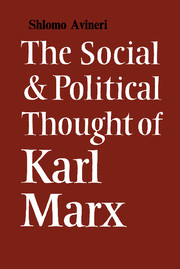Book contents
- Frontmatter
- Contents
- Preface
- TO THE MEMORY OF MY FATHER
- Introduction
- 1 Hegel's political philosophy reconsidered
- 2 The proletariat: the universal class
- 3 Homo faber
- 4 Alienation and property
- 5 Praxis and revolution
- 6 The revolutionary dialectics of capitalist society
- 7 The French Revolution and the terror: the achievements and limits of political revolution
- 8 The new society
- Epilogue: the eschatology of the present
- Bibliography
- Index
1 - Hegel's political philosophy reconsidered
Published online by Cambridge University Press: 05 June 2012
- Frontmatter
- Contents
- Preface
- TO THE MEMORY OF MY FATHER
- Introduction
- 1 Hegel's political philosophy reconsidered
- 2 The proletariat: the universal class
- 3 Homo faber
- 4 Alienation and property
- 5 Praxis and revolution
- 6 The revolutionary dialectics of capitalist society
- 7 The French Revolution and the terror: the achievements and limits of political revolution
- 8 The new society
- Epilogue: the eschatology of the present
- Bibliography
- Index
Summary
THE IMPACT OF HEGEL AND FEUERBACH
Marx's programmatic letter to his father, 10 November 1837, informs us that his first encounter, at the age of nineteen, with Hegelian philosophy, occurred through his acquaintance with the Doktorenklub at Berlin University. In this most revealing letter Marx gives a comprehensive account of his studies at Berlin, trying to justify to his father his switch from legal studies to philosophy.
It becomes clear from this letter that even at this early stage Marx was drawn to Hegel's philosophy because he saw in it a powerful instrument for changing reality. He might have used such an argument in the attempt to anticipate his father's possible objection to the change of subject: the father, himself a lawyer, felt that his son's step was impractical and immature. Marx writes that what troubled him about German philosophy since Kant was ‘the antagonism between the “is” and the “ought”’. But now, since he has become acquainted with Hegel, the young student feels he has found the idea within reality itself: ‘If the Gods have dwelt till now above the earth’, he tells his father, ‘they have now become its centre.’
This first evidence of Marx's encounter with the Hegelian tradition seems to foreshadow the way in which Hegel was absorbed by Marx from the outset. It was neither the institutional conclusions of Hegel's doctrine that attracted him, nor the philosophical premises per se.
- Type
- Chapter
- Information
- The Social and Political Thought of Karl Marx , pp. 8 - 40Publisher: Cambridge University PressPrint publication year: 1968
- 2
- Cited by

